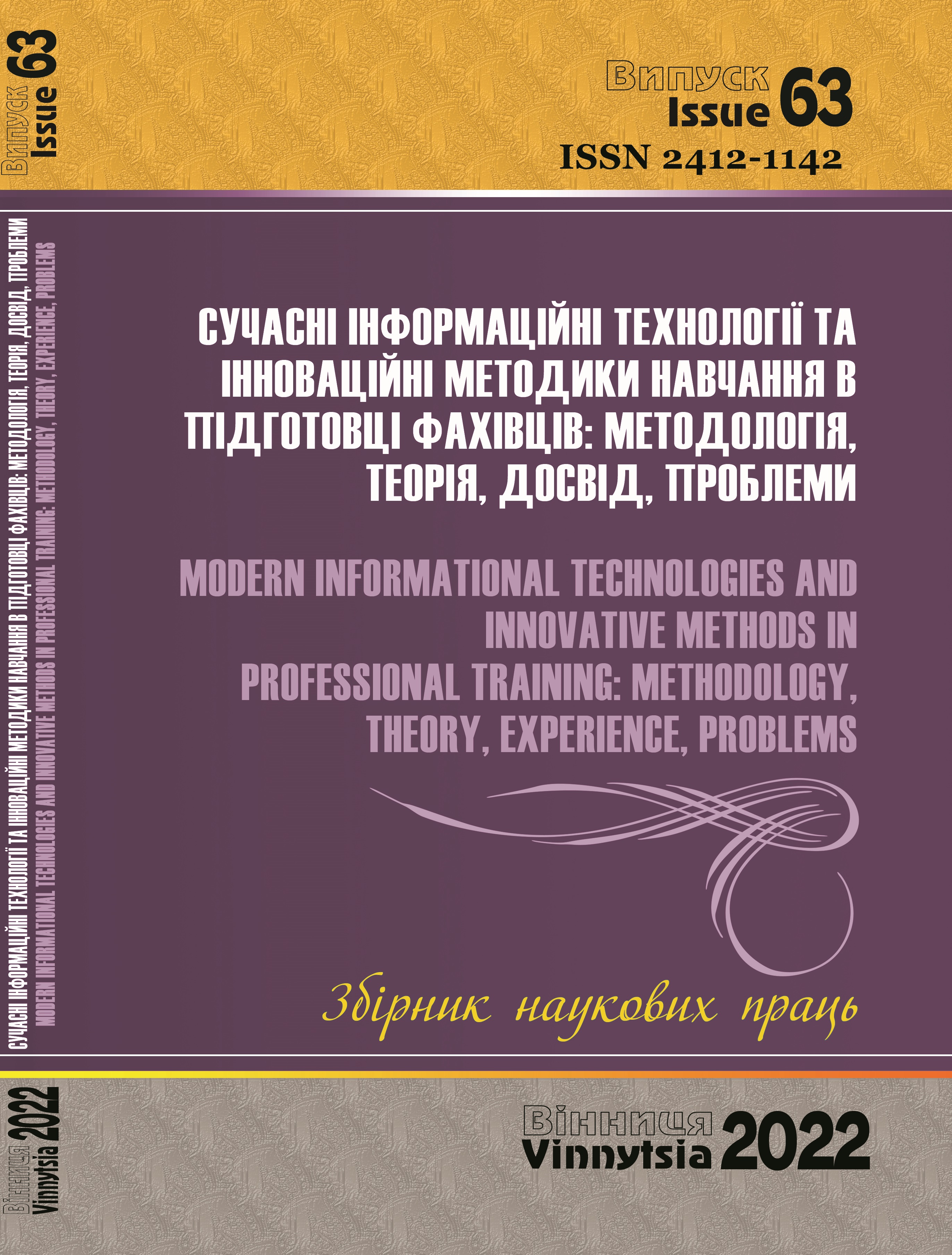ANALYSIS OF APPROACHES TO THE IMPLEMENTATION OF THEORETICAL CONCEPTS OF FOREIGN AUTHORS IN THE ORGANIZATION OF DISTANCE FORMS FORMS OF EDUCATION IN GENERAL SECONDARY EDUCATION IN UKRAINE
DOI:
https://doi.org/10.31652/2412-1142-2022-63-19-28Keywords:
Distance learning, theories of distance learningAbstract
The purpose of the article is to analyse the approaches of the theoretical concepts implementation
of foreign authors for the distance learning organization in general secondary education of Ukraine.
During recent decades, foreign scholars have proposed many theories of distance learning, the content of
which have been influenced by society, politics, economics, and technology. Theoretical concepts diverge,
forming several directions. The main ones are: the theory of autonomy and independence, the theory of
industrialization of teaching, the theory of interaction and communication, the theory of distance learning.
Proponents of the theory of autonomy and independence insist on an autonomous, asynchronous principle
of distance learning, in which there is no dialogue between teacher and recipient of knowledge. One of
them is Charles A. Vedemeyer, the developer of the theory that became known as open and distance
education. The author of the theory of industrialization of learning O. Peters considers distance learning as
a product of the industrial age and, arguing that distance learning can not be analyzed in terms of
conventional didactics, defines another basis for analysis - comparison with industrial production. O. Peters
proposed the use of economic and industrial theory for the analysis of distance learning, gave educational
terminology an industrial definition. In contrast to O. Peters, proponents of the theory of interaction and
communication B. Holmberg, J. Beet, D. Sewart emphasized the importance of psychological, pedagogical
and information technology aspects in the process of teacher-student interaction during distance learning.
The article considers distance learning in general secondary education as a component of digital
transformation of education and summarizes the results of the analysis of approaches to the implementation
of theoretical concepts of foreign authors on the organization of distance learning in general secondary
education in Ukraine. The analysis of theoretical concepts and possibilities of realization in establishments
of general secondary education of Ukraine is carried out.
Downloads
References
Відкрита та дистанційна освіта: від теорії до практики: зб. матер. ІІІ Всеукр. електронної наук.-практ.
конф., 27 вересня 2018 р. [ред. кол.: Л. Л. Ляхоцька (голов. ред.), С. П. Касьян, С.В.Антощук, Т.І. Сябрук].
– К. : ДВНЗ «Ун-т менеджменту освіти» НАПН України, 2018. – 166 c.
Гуржій А.М., Глазунова О.Г., Волошина Т.В. Цифровий навчальний контент для системи відкритої освіти:
Сучасні інформаційні технології та інноваційні методики навчання у підготовці фахівців: методологія,
теорія, досвід, проблеми: Збірник наукових праць. Випуск 55. Київ-Вінниця: ТОВ фірма «Планер», 2020.
с.
Пилаєва Т.В. До питання про історію розвитку теорій дистанційного навчання Педагогіка формування
творчої особистості у вищій і загальноосвітній школах : зб. наук. праць / [редкол. : Т. І. Сущенко (голов.
ред.) та ін.]. – Запоріжжя, 2012.
Штефан Л. А., Борзенко О. П. Ш90 Особливості організації дистанційного навчання студентської молоді
в Канаді : ретроспективний аналіз : монографія / Л. А. Штефан, О. П. Борзенко. – Х.: ХНАДУ, 2015. –
с.
Delling R.M. Briefwechsel als Bestandteil und Vorlaufer des Fernstudiums (Ziff papiere19). – Hagen: Fernuniversitat (ZIFF), 1978. – 38 p. Режим доступу: https://ub-deposit.fernuni-hagen.de/receive/mir_mods_00000292
Шуневич Б.І. Порівняльний аналіз зарубіжних теорій дистанційного навчання. // Вісник
Дніпропетровського університету імені Альфреда Нобеля Серія «Педагогіка і психологія». – Дніпро, 2012.
-No2. – С. 106-108
Peters O. Theoretical aspects of correspondence instruction’, in O. Mackenzie and E.L. Christinsen (eds) The
Changing World of Correspondence Study, University Park, Pa. and London: Pennsylvania State University. –
– P. 19–34. Режим доступу: https://files.eric.ed.gov/fulltext/ED041214.pdf
Holmberg B. The sphere of distance-education theory revisited (ERIC Document Reproduction Service No/ ED
578), 1995.
Holmberg B. “Guided didactic conversation in distance education” in D.Sewart, D. Keegen, B.Holmberg (eds):
Distance Education: international Perspectives. – London, 1983.
Шуневич Б. ПОРІВНЯЛЬНИЙ АНАЛІЗ СУЧАСНИХ ЗАРУБІЖНИХ ТЕОРІЙ ДИСТАНЦІЙНОГО
НАВЧАННЯ // Вісник Львівського державного університету безпеки життєдіяльності. – Львів: Вид-во
ЛДУ БЖД, 2015. – No 12. – С. 275.
Литвинова С.Г. Напрями цифрової трансформації освітнього процесу закладів загальної середньої освіти
України Сучасні тенденції розвитку інформаційно-комунікаційних технологій в освіті: зб. Матеріалів ІІ
Міжнародної науково-практичної конференції в рамках Міжнародного освітнього форуму «Цифрова
трансформація освіти» / упоряд. Н. А. Басараба ; за ред. А. Л. Черній, І. В. Вєтрова, В. С. Безрученка. –
Рівне : РОІППО, 2020. – С. 33-35.
Шиліна Г.А. Методика дистанційного навчання української мови учнів основної школи. Дисертація на
здобуття наукового ступеня кандидата педагогічних наук. -Київ, 2016. -Режим доступу: Microsoft Word -
Шиліна_Г_А_Дисертація.pdf
Downloads
Published
Issue
Section
License
Copyright (c) 2022 Світлана Литвинова, Наталія Водоп’ян

This work is licensed under a Creative Commons Attribution 4.0 International License.

